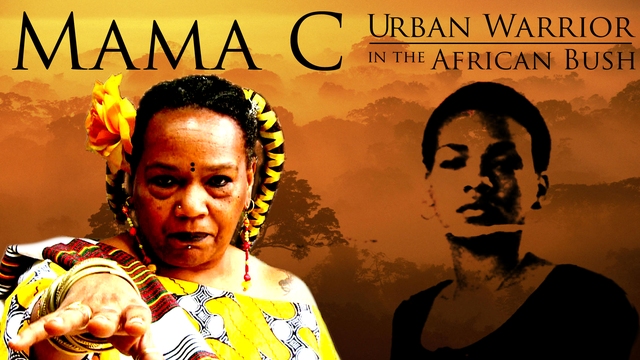Mama C
A USA Black Panther exile explores her African identity
 Raised in the violent segregation of 1960s Kansas, former Black Panther and artist Mama C has lived in Africa for most of her life. Her story is a journey through African identity and gives us a powerful meditation on identity, exile and art.
Raised in the violent segregation of 1960s Kansas, former Black Panther and artist Mama C has lived in Africa for most of her life. Her story is a journey through African identity and gives us a powerful meditation on identity, exile and art.


 "In my freshly landed, just got off the boat enthusiasm for living in Africa, I tried to blend, to melt, homogenize, disappear, erase the essence of what made me who I was and am, an African, who grew up in, and was moulded by, the hoods of America. I almost lost myself self", Charlotte O'Neal, aka Mama C, booms out in her rich, velvet voice. This poeticism is imbued in every aspect of her life, as she manages to tackle her African-American identity and exile with rare eloquence and insight.
As a teenager living in the tinder box that was Kansas during the Civil Rights Movement, she ran away from home and joined the Panthers. But shortly afterwards, as the city exploded in violence, she and her new husband had to leave. As he explains, "They had police stationed outside our houses, we were under constant surveillance and I said to Charlotte, we won't live much longer."
Now living in Tanzania they run a home for extremely disadvantaged children and Mama C continues to make her art and explore her complex relationship with Africa and her homeland. "I had brothers and sisters come from the states that tell me Mama C, you're free to do that because you're not under this constant pressure of racism that we are living in the west." She explains how the feeling in Africa is so different to the world she grew up in, "there wasn't a shield up that you had to constantly have wrapped around you when you're in the west". She speaks of how the perspective of exile has completely changed her life and outlook, "You know being here, living here in Africa but also looking at myself as a part of the international community, as a part of the global family, has really freed my spirit".
A true revolutionary and trailblazer, her words speak to a remarkable universal vision of what society should be: "Tribalism, no! Tribal wisdom is what we want. Peace, love and unity."
LEARN MORE.
"In my freshly landed, just got off the boat enthusiasm for living in Africa, I tried to blend, to melt, homogenize, disappear, erase the essence of what made me who I was and am, an African, who grew up in, and was moulded by, the hoods of America. I almost lost myself self", Charlotte O'Neal, aka Mama C, booms out in her rich, velvet voice. This poeticism is imbued in every aspect of her life, as she manages to tackle her African-American identity and exile with rare eloquence and insight.
As a teenager living in the tinder box that was Kansas during the Civil Rights Movement, she ran away from home and joined the Panthers. But shortly afterwards, as the city exploded in violence, she and her new husband had to leave. As he explains, "They had police stationed outside our houses, we were under constant surveillance and I said to Charlotte, we won't live much longer."
Now living in Tanzania they run a home for extremely disadvantaged children and Mama C continues to make her art and explore her complex relationship with Africa and her homeland. "I had brothers and sisters come from the states that tell me Mama C, you're free to do that because you're not under this constant pressure of racism that we are living in the west." She explains how the feeling in Africa is so different to the world she grew up in, "there wasn't a shield up that you had to constantly have wrapped around you when you're in the west". She speaks of how the perspective of exile has completely changed her life and outlook, "You know being here, living here in Africa but also looking at myself as a part of the international community, as a part of the global family, has really freed my spirit".
A true revolutionary and trailblazer, her words speak to a remarkable universal vision of what society should be: "Tribalism, no! Tribal wisdom is what we want. Peace, love and unity."
LEARN MORE.
WATCH MORE.
JOIN THE DISCUSSION.




